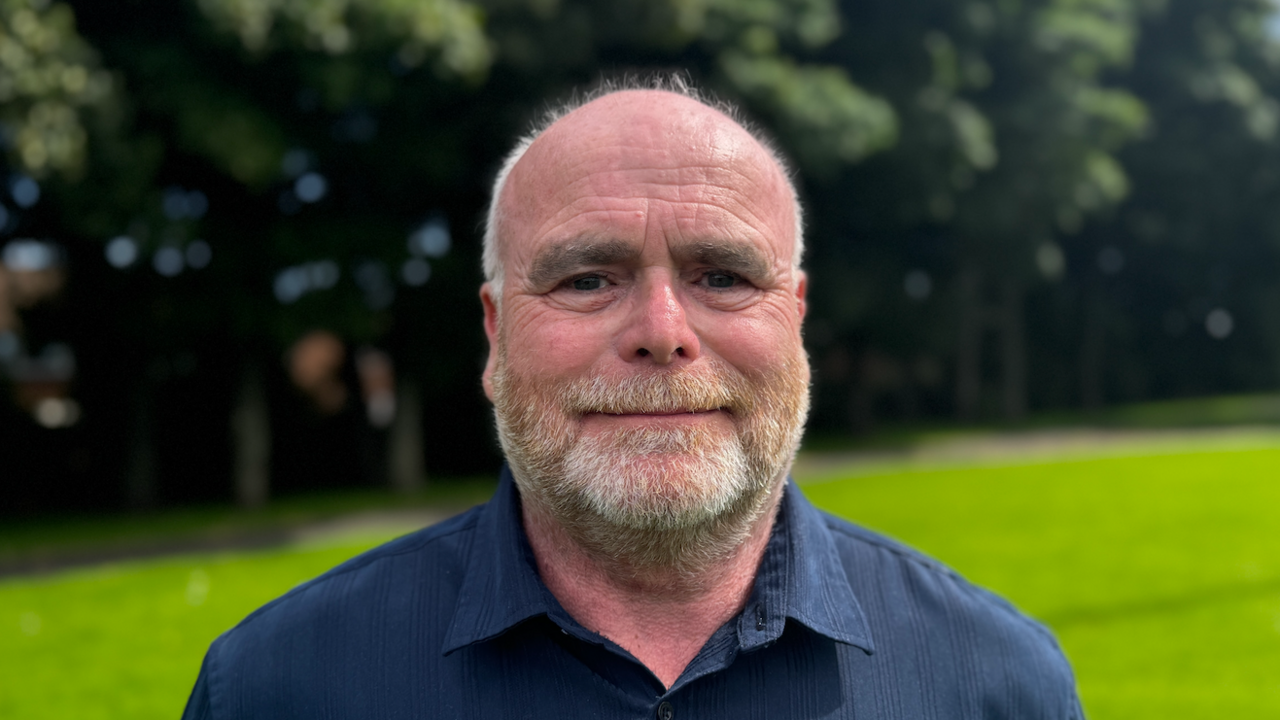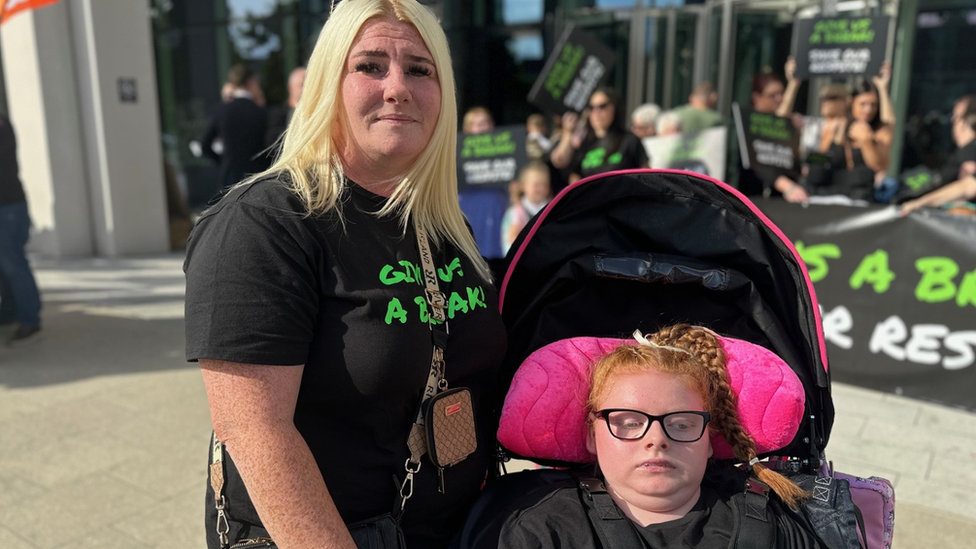Disabled children face 80-mile round trip for care

Pamela Mann and John Stormont work round the clock to look after their daughter, Tara
- Published
Parents of disabled children say they have to trek up to 80 miles (129km) each day for overnight respite care after a city's only facility closed.
Families in Sunderland told the BBC they had been "on their knees" ever since the council-operated service at Grace House was axed over funding last year.
The Labour-run local authority was due to open a dedicated facility in East Rainton in autumn this year, but the plans have since been withdrawn.
A spokesperson said alternative arrangements for respite care were "in place" and it remained "absolutely committed" to getting the "best for all children".
But parent Pamela Mann said the council failed to "learn any lessons" after the loss of the original respite service at Sea View Road West centre in Ryhope, back in 2016.
That facility, which was eventually replaced by a service housed inside Grace House later that year, was also closed because of "economic", external and funding pressures.

Grace House and Together for Children (TfC) failed to reach an agreement to keep services at the site
Ms Mann, a full-time carer to her daughter Tara, now 25, said she knew what it was like to have "nowhere to go" after her daughter faced being "turfed out" at the time.
The ex-Conservative councillor, who campaigned to save services at Grace House, said: "It happened to me 10 years ago when my child was in children's services [Sea View].
"It's now 10 years later, no lessons have been learned and families are still in this position."
Her daughter has Ohdo Syndrome - a rare condition which causes underdevelopment of the body, meaning she cannot speak and requires round-the-clock care.

Tara, who cannot speak, requires constant monitoring and care
Ms Mann, who eventually had to give up employment to care for Tara, said: "She's adorable and she does try to communicate in any way she can, but it's like having a toddler.
"She needs full-time care, she's non verbal and fed through a tube directly into her stomach and requires 24/7 care.
“What happens when you don’t receive a night off is that you become more tired by the day... you're going on as an unpaid worker without a day off."
'Damn disgrace'
Another parent said she was "suffering" after her 16-year-old stopped being able to access overnight respite care in the city when the Grace House service closed.
The woman, who wished not to be named, said the only breaks being offered to her son were at a facility in Redcar, Teesside, about 40 miles (64km) away.
“When he was at Grace House, I'd have to drop him off five minutes up the road and now it's an 80-mile round trip," she said.
"It's not a break... he's getting bigger, stronger. It's not getting easier - it's a damn disgrace."

Conservative councillor Simon Ayre said the council was not "fulfilling" its duty to provide overnight care
Plans to restore overnight short breaks in the city by moving into Red Gables, a five-bedroom home, have been withdrawn due to what the council said was a legal "technicality".
However, it has not provided an exact date on when the plans could be resubmitted, prompting fears of further delays to the service.
Conservative city councillor Simon Ayre accused the authority of "kicking the can down the road".
He said: "I think the end result is they're just going to hope that everyone is sick and goes quiet but families need this respite provision, and they need it urgently.
“The council has a duty, a duty to the families and carers and they're not fulfilling that duty."
'Plans progressing'
The council and Together for Children - which runs children's services on its behalf - said arrangements were being made as it became aware the facility at Grace House would close.
"Everybody has remained absolutely committed to ensuring that we get the best for all children in our city," a spokesperson said.
"We purchased the Red Gables property so that we could have our own special property.
"We have kept families up to date with this work on Red Gables, put alternative respite arrangements in place, and are continuing to progress our plans."

Harriet Edwards says it is "disappointing" to hear of delays to the replacement provision on Wearside
It comes as Sense, a charity which raises awareness of respite care, found one in five carers across the country could not remember the last time they took a break.
Meanwhile, they said a third told the charity they did not receive any support to access respite provision.
Harriet Edwards, its head of policy, public affairs and research, said: "It's a dangerous situation, carers are getting burnt out, and are at breaking point - it's not a way to continue."
She said the problems were not just in Sunderland, but across the UK.
"Although this is really sad and disappointing to hear how long its taking to get replacement care in this example, we know local authorities across the country are struggling to pay for respite care as they're struggling to pay for social care services too.
"There has to be some solution to this national funding problem."
The Department for Education said it worked with councils to "test different approaches" to providing support.
"Local authorities are responsible for providing the right respite support for children with SEND in their areas and we’ll continue to work with them to make sure they can respond to the needs of our brilliant carers," a spokesperson said.
Follow BBC Sunderland on X (formerly Twitter), external, Facebook, external and Instagram, external. Send your story ideas to northeastandcumbria@bbc.co.uk.
Related topics
- Published23 July 2023

- Published13 September 2023

- Published21 December 2023
